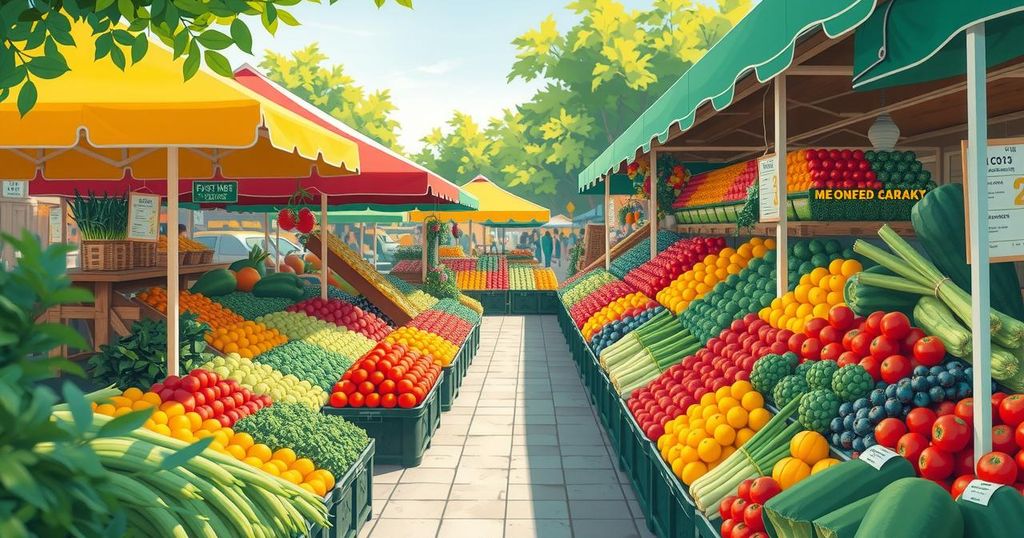Food Retailers in South Africa: Navigating Inflationary Pressures and Market Dynamics
South Africa’s recovering economy is affecting the food sector, with improving GDP growth and lower interest rates potentially increasing consumer spending. Shoprite shows strong revenue growth while Spar faces challenges. AVI is cautious, and Tiger Brands remains optimistic about future consumer demand, creating a complicated landscape for food retailers and producers alike.
As South Africa’s economy experiences signs of recovery, the food industry is poised for significant changes. Factors such as lower interest rates and improved GDP growth, alongside the anticipated cash injection from the two-pot retirement system, could enhance consumer spending. The question remains: will food producers or retailers benefit more from these developments?
The combination of improving GDP growth, interest rate reductions, and savings withdrawals is expected to increase consumption and boost food sector volumes. Food producers are likely to experience a recovery in margins and earnings, thanks in part to reduced commodity price inflation. However, food price inflation may begin to escalate by the first quarter of 2025, benefiting food retailers historically known to re-rate in inflationary environments anticipating stronger earnings growth.
Focusing on the competitors within the sector, Shoprite has demonstrated significant success, achieving a remarkable 10.4% revenue growth without increasing promotional subsidies, amidst a low inflationary backdrop. Their strategic advantages include new loyalty partnerships and expansion in their outlets. Although like-for-like growth decreased to 5.4% in the first half of 2025, continued strong volume growth has encouraged further improvements in gross and operating margins.
Notably, Shoprite’s lower costs from load shedding positively impacted their trading profit in the first half of 2025, while their balance sheet is robust, expected to present a net cash position following the proposed R2.7 billion furniture sale. Despite high capital intensity, Shoprite remains a quality entity in South Africa’s food retail sector, outperforming the general retailer index during market weaknesses.
Conversely, Spar’s outlook reveals a need for a strategic reset and refocus. Despite certain encouraging prospects, their recent trading update indicated weaker-than-expected revenue growth across South Africa and Ireland. Southern Africa’s revenue growth was recorded at 3.4%, despite the planned closure of 13 grocery stores impacting sales, coupled with decreased promotional activities and supply challenges.
However, there is a silver lining as Spar was able to reduce operating losses from their corporate grocery and liquor divisions. This update has contributed to some underperformance yet follows a previous re-rating post-corporate strategy reset.
In a more cautious tone, AVI recently reported a modest growth of 9% year-over-year in headline earnings per share, contrasting with only a 1% increase in group revenue. Despite broad divisional underperformance, the Entyce division notably thrived with a 44% growth in operating profit. However, management cautioned that future profit growth might not align with first-semester performance, suggesting a slowdown for the next six months unless market conditions improve.
Tiger Brands reported a 3% rise in revenue attributed to both volume and price inflation, stemming from initiatives designed to decrease input costs. They announced a significant equity stake sale in Chile’s Empresas Carozzi, showcasing their commitment to optimizing capital allocation and focusing on growth strategies. Management expressed optimism about the consumer environment’s recovery and remains focused on driving volume and profit heading forward.
In conclusion, the South African food retail sector exhibits mixed dynamics as inflation pressure mounts. Shoprite leads with considerable revenue growth but faces high capital demands, while Spar seeks recovery amidst strategic adjustments. AVI conveys a cautious outlook, contrasting with Tiger Brands’ optimistic forward-looking stance. Overall, the evolving economic landscape presents both challenges and opportunities for food producers and retailers in the country.
Original Source: www.zawya.com




Post Comment